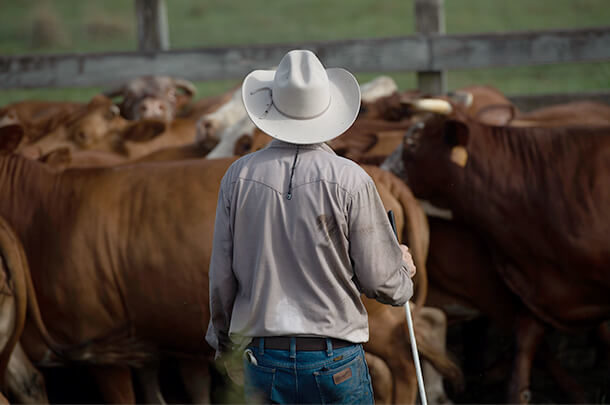Challenges in 2020 for U.S. agriculture have been substantial, yet with them come opportunities to grow—and recent legislation is proving it. In this article, we will discuss the five biggest legislative actions for the U.S. livestock sector and what each bill means for cattle ranchers.
Requiring Assistance to Meat Processors for Upgrading Plants (RAMP-UP) Act
COVID-19 highlighted the importance of having a diversified processing system to keep our food supply chain resilient to disruption. Introduced on August 6th by House Agriculture Committee Chairman Collin Peterson, along with a number of bipartisan supporters, the RAMP-UP Act aims to establish funding for existing meat processors to upgrade facilities for federal inspection.
Impact on U.S. Cattle Ranchers
Through this legislation, smaller processors would have the resources to upgrade their facilities, level the processing playing field, and deconsolidate the industry.
“The COVID-19 pandemic caused unprecedented disruptions to beef processing which were devastating to cattle producers. The RAMP-UP Act addresses these supply chain issues by ensuring cattle ranchers and farmers have robust access to new markets regardless of where their livestock is processed.”
— Don Schiefelbein, Vice President of National Cattlemen’s Beef Association.
The Cattle Market Transparency Act of 2020
An amendment to the Packers and Stockyards Act of 1921, the Cattle Market Transparency Act was introduced by U.S. Senator and Agriculture Committee Member Deb Fischer on September 22nd to establish mandatory minimum thresholds for negotiated cash trades and prohibit confidentiality guidelines that block ranchers’ access to full market information. If passed, it would regulate price transparency, establish regional cash minimums, and document marketing contracts between packers and ranchers.
Impact on U.S. Cattle Ranchers
This bill would be a step in the right direction to address the issue of price manipulation and restore competition and accountability among processors.
“My legislation seeks to bring transparency and accountability to the cattle market. It will ensure there are a sufficient number of cash transactions to facilitate price discovery, and equip producers with more price information to assist them with their marketing decisions.”
— Senator Deb Fischer.
Haulers of Agriculture and Livestock Safety (HAULS) Act
Also introduced by Senator Deb Fischer, the HAULS Act aims to rectify existing federal regulations that fail to account for the intricacies of transporting live animals. With the support of more than 100 agriculture organizations, this bill would extend hours of service exemptions for ag commodities year-round.
Impact on U.S. Cattle Ranchers
This bill would address situations where haulers are forced to choose between compliance and livestock welfare while creating needed flexibility to accommodate for seasonal spikes in transportation of livestock and perishable commodities.
“One of the unique situations that we find ourselves in agriculture is that we are sometimes dealing with live animals or perishable commodities. The animal piece is really key in where we need to make sure that we are using common sense and have the needed flexibilities to ensure safety. That’s what the HAULS Act looks to do, is to make sure that perishable commodities like livestock can get to their destination safely, that driver can get to their destination safely, and then that driver rests.”
— Andrew Walmsley, American Farm Bureau Federation Congressional Relations director.
The Strengthening Local Processing Act
Endorsed by a number of agricultural organizations including the U.S. Cattlemen’s Association and Nations Farmers Union, the Strengthening Local Processing Act—also known as the Fortenberry-Pingree Bill in honor of its founders—would authorize a $10 million grant program for universities to implement meat processing training programs. It would also create an additional $10 million program for small processors to offset training costs of new meat processors.
Impact on U.S. Cattle Ranchers
This bill would reduce the regulatory burden on small processors and provide resources to build a more resilient workforce and expand processing options for local ranchers.
“There is a broadening concern over corporate concentration in the meatpacking industry. In a previous time, we had more local meat processing. This bill helps stimulate a return to that previous model, creating a robust market in local economies, linking the farm to the family.”
— Congressman Jeff Fortenberry.
The Price Reform in Cattle Economics (PRICE) Act
In response to an investigative report that identified systematic issues in cattle market pricing, South Dakota Representative Dusty Johnson introduced the PRICE Act on October 1st, 2020. Similar to the Cattle Market Transparency Act, this bill would create greater transparency in price reporting. Gaining the support of more than a dozen bipartisan House members and several national agriculture organizations, it would also provide risk management solutions for small processors along with financing opportunities to rancher-owned cooperative processing.
Impact on U.S. Cattle Ranchers
This bill would improve transparency in the cattle market while supporting processing expansion and new processor development.
“The PRICE Act is the answer to many of the issues our ranchers have faced for years. Our producers want a fair market and fair prices, and that’s what this bill delivers. Congress needs to deliver for cattle country.”
— Dusty Johnson, South Dakota Representative.
The Silver Lining in Economic Volatility
While American ranchers’ ability to pivot and rebound despite severe disruption has been truly astounding, processing consolidation and price manipulation have created a stark imbalance within the industry. For all the challenges the COVID-19 pandemic brought us, it also highlighted this issue and made cattle market reform a priority at a federal level. Through adversity comes a stronger future.
Visit AgAmerica.com to stay updated on current events impacting U.S. agriculture.









